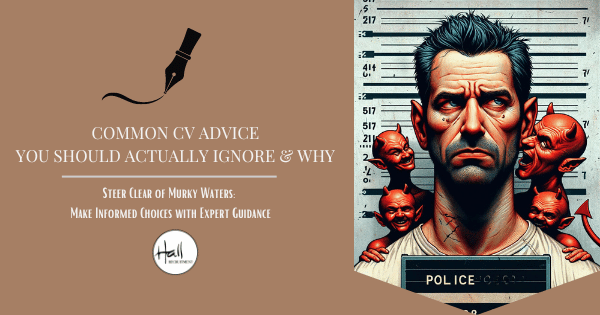
Common CV Advice You Should Actually Ignore And Why
Steer Clear of Murky Waters: Make Informed Choices with Expert Guidance
Introduction:
After more than 50 years in recruitment, I’ve sifted through enough CVs to wallpaper every pub and restaurant in Dublin. Now, with more than two decades running my own agency, I’ve seen all sorts of advice dished out to job seekers. Some tips are as useful as a chocolate teapot, while others can genuinely help you land that dream job. However, let’s set the record straight on a few commonly regurgitated pieces of CV advice that you might just be better off ignoring.
For Guides on How to Write Your CV – Click Here!
This nugget is as persistent as it is perplexing. While brevity can be a virtue, especially if you’re just starting out, it’s not a one-size-fits-all strategy. At Hall Recruitment, we want to see the full picture of your professional journey. That one-pager might work if you’re applying directly to a harried HR manager who’s juggling a hundred other tasks. But for those with a rich history of varied roles, compressing your life’s work into a single page could do you more harm than good. Instead, focus on relevance and clarity. If it takes two pages to crisply convey your qualifications and experience, then so be it.
Ah, the great debate—education or experience at the forefront? This is highly situational. If you’re fresh out of university, your academic achievements might indeed be your strongest selling point. However, for those who’ve been in the workforce for a few years, your practical experience should lead the charge. Tailor this aspect depending on what stage you are in your career and what will most impress your potential employer, not what you did decades ago.
This piece of advice is often served with the best intentions, but it can backfire if not handled with care. A professional profile can be a powerful opener if well-crafted; it can summarise your expertise and objectives succinctly. However, if it’s filled with buzzword bloat and vague assertions, it’ll likely be skipped over. If you can’t articulate your professional essence powerfully in a few sentences, you might be better off letting your experience speak for itself.
The common instruction to list your employment history in strict chronological order is not without its merits; it presents a clear, linear progression of your career. However, the insistence on sticking to this format no matter the circumstances can be misguided. It’s important to remember that your CV should serve as your personal marketing tool. Thus, it should highlight the most relevant experiences first, especially if they directly align with the job you’re applying for.
Certainly, a traditional chronological layout can help demonstrate stability and progression, which can be particularly effective if you’ve been steadily climbing the ranks within the same industry. But what if your most relevant experience isn’t your most recent? In such cases, consider a hybrid approach. You might start with a section titled ‘Relevant Experience’ where you list the jobs that make the strongest case for your candidacy, followed by a comprehensive, but succinct, chronological list that includes all roles, demonstrating your work ethic and continuity.
Remember, a CV isn’t just a retrospective list—it’s a strategic tool. If you’re concerned about gaps, address them briefly in your cover letter or interview. It’s always better to shape your story in a way that puts your best foot forward rather than sticking rigidly to a formula that doesn’t showcase your strengths. After all, the goal is to get that interview, not just to tick boxes.
Conclusion:
Remember, your CV is not just a cold list of dates, places, and job titles; it’s your personal brochure. It should highlight your strengths and give a peek into your character. Every piece of advice you follow should be applied with a dollop of common sense and a pinch of your own professional seasoning. Keep it honest, make it engaging and tailor it to the audience. After all, in recruitment—as in life—it’s all about knowing your audience and speaking directly to their needs.
Now, go forth, polish that CV, and show them why you’re the right fit. If you’ve got any doubts or need a bit more of a guiding hand, you know where to find us at Hall Recruitment—after all, with over two decades in the business, we’re not just another agency, we’re your career partners.




